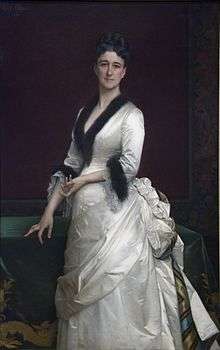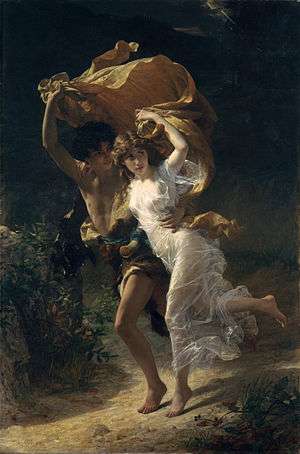Catharine Lorillard Wolfe
Catharine Lorillard Wolfe (8 March 1828 – 4 April 1887) was an American philanthropist and art collector.[1] Though she gave large amounts of money to institutions such as Grace Episcopal Church and Union College, her most significant gifts were two bequests to the Metropolitan Museum of Art in New York City. She left her large collection of popular contemporary paintings to the museum, together with $200,000.[2]
Catharine Lorillard Wolfe | |
|---|---|
 Portrait of Wolfe by Cabanel, 1876 | |
| Born | March 8, 1828 |
| Died | April 4, 1887 (aged 59) Manhattan, New York, U.S. |
| Resting place | Green-Wood Cemetery, Brooklyn, New York |
| Parent(s) | John David Wolfe Dorothea Lorillard |
| Relatives | Pierre Lorillard II (grandfather) Pierre Lorillard III (uncle) George Bruce (uncle) |

Early life and family
Wolfe was the daughter of John David Wolfe (1792–1872),[3][4] and Dorothea Ann Lorillard (1798–1866).[5] Her father was a New York merchant and real estate developer who was the president and a founder of the American Museum of Natural History while her mother was a partial inheritor of the Lorillard tobacco fortune.[6] Her sister was Mary Lorillard Wolfe (1823–1847), who was married to William Bayard Hoffman (d. 1880) before her early death,[7] and her brother was David Lorillard Wolfe (1825–1829), who died young.[5]
Her paternal grandfather was David Wolfe (1748–1836), an officer during the Revolution in the Paymaster's department,[3] and her maternal grandfather was Pierre Lorillard II (1764–1843), both of New York[6] Her aunt, Catherine Wolfe, married George Bruce (1781–1866).
Life
Wolfe led a private and sheltered life after the death of her mother in 1867.[8] After the death of her father in 1872, she inherited the family fortune which was estimated at $12,000,000 (equivalent to $256,100,000 in 2019),[8] which she used to continue their philanthropic activities.[9] She supported the Newsboys' Lodging House and Industrial School (an outgrowth of Charles Loring Brace's movement to help care for New York's homeless children); she financed archaeological missions, including one that unearthed Nippur; she was also involved with the American Museum of Natural History. She provided $10,000, half the funding for the creation of Bishop Whitaker's School for Girls in Reno, Nevada, on the condition that Episcopal Bishop Ozi William Whitaker raise the other half from other sources. The school was founded in 1876 and operated until 1894.
Wolfe, who did not marry, had a home in Newport, Rhode Island, known as "Vinland," designed and built in 1882 by Peabody & Stearns that featured a Romanesque Revival style exterior consisting of red sandstone with Aesthetic Movement style elements,[10] and built on land acquired from the estate of William Beach Lawrence for $200,000.[11] She also had a home in Throggs Neck and in Madison Square and East 24th Street in New York City.[12]
The Wolfe Fund
The bequest of her art collection was her most significant philanthropic endeavor. Her collection gave the Metropolitan its first significant representation of the kinds of paintings that appealed to the general public.[13] Star attractions in her collection included Ludwig Knaus's Holy Family and Jules Breton's Procession of Pardon in Brittany.[14] The opening of the Catharine Lorillard Wolfe Wing displaying these popular paintings, coupled with the Museum's simultaneous acquisition by gift of Rosa Bonheur's enormously popular painting The Horse Fair (1853–55), brought to the Metropolitan, for the first time, large numbers of people from beyond the elite circles that traditionally constituted its audiences. The large crowds that Wolfe's collection attracted encouraged other American museums to similarly reach out to members of America's emerging urban middle classes.
Wolfe's gift of $200,000 (equivalent to $5,691,000 in 2019) was the first permanent endowment fund for buying art ever given to a major American museum.[15] It helped launch the competitive cycle of giving that transformed museums in New York, Boston, Philadelphia, and Chicago, from the private pursuits of rich art lovers to professional institutions dedicated to educating large audiences and promoting modern art. Among the masterpieces of world art that the Metropolitan has since acquired using the Wolfe Fund are Pierre-Auguste Renoir's Madame Charpentier and her Children, Jacques-Louis David's Death of Socrates, and Winslow Homer's The Gulf Stream.
Estate
Wolfe died at age 59 in April 1887.[12] According to her obituary in The New York Times, "Society people have always understood that she had a romance, and her father's will implies as much. But whatever the fact, it has not been discussed for many years."[12]
A simple funeral service was held for her at Grace Church with Charles G. Landon, Cornelius Vanderbilt, Benjamin Hazard Field, Robert E. Livingston, the Rev. Dr. William Ferdinand Morgan, William Colford Schermerhorn, John Jacob Astor III, and J. M. Brown acting as pallbearers.[16] The attendees included Mr. and Mrs. Pierre Lorillard, Mr. and Mrs. Jacob Lorillard, Mr. and Mrs. Lewis Lorillard, Mr. and Mrs. Kernochan, Mrs. Barhey, Col. and Mrs. Kip, Mr. and Mrs. David Wolfe Bishop (her second cousin),[17] Mr. and Mrs. Bruce, Mr. and Bruce Brown, Catherine Wolfe Bruce, Mr. and Mrs. John Wolfe, the Misses Hoffman, Mr. and Mrs. Pierre Lorillard, Jr., Mr. and Mrs. Kent, Griswold Lorillard, Jacob Lorillard, ex-Judge Charles A. Peabody, and Albon P. Man.[16]
Her estate, which was worth between $8,000,000 (equivalent to $227,644,000 in 2019) and $10,000,000 (equivalent to $284,556,000 in 2019) consisted of land, stores, dwellings, factories, oil paintings, water colors, stocks, bonds, mortgages, money and other real and personal property.[2][18] The executors of her estate were David Wolfe Bishop and David Wolfe Bruce.[19][20] The principal beneficiaries, besides the Metropolitan Museum, were her extended family members.[19][21]
References
- "THE FINE ARTS.; THE LOAN COLLECTION. CONTINUATION OF THE SOUTH ROOM THE NOBLE PICTURES OF MISS CATHARINE L. WOLFE GEMS FROM OTHER COLLECTIONS". The New York Times. 25 June 1876. Retrieved 5 May 2017.
- "MISS WOLFE'S MILLIONS.; THE WAYS IN WHICH THEY WILL BE DISTRIBUTED". The New York Times. 10 April 1887. Retrieved 4 May 2017.
- "OBITUARY.; John David Wolfe". The New York Times. 20 May 1872. Retrieved 5 May 2017.
- "Funeral of the Late John David Wolfe". The New York Times. 22 May 1872. Retrieved 5 May 2017.
- Supreme Court. General Term- First Department. 1892. Retrieved 5 May 2017.
- The National Cyclopaedia of American Biography. New York, NY: J.T. White & Company. 1900. p. 411. Retrieved 12 September 2016.
Catharine Lorillard Wolfe bio.
- "Dorothea Wolfe Hoffman (1866-1907)". www.nyhistory.org. New-York Historical Society. Retrieved 5 May 2017.
- Appleton's Annual Cyclopædia and Register of Important Events of the Year 1887. | EMBRACING POLITICAL, MILITARY, AND ECCLESIASTICAL AFFAIRS; PUBLIC DOCUMENTS; BIOGRAPHY, STATISTICS, COMMERCE, FINANCE, LITERATURE, SCIENCE, AGRICULTURE, AND MECHANICAL INDUSTRY. | New Series, Vol. XII. New York: D. Appleton & Company. 1889. p. 807. Retrieved 5 May 2017.
- "Archives Directory for the History of Collecting". research.frick.org. Frick Collection. Retrieved 5 May 2017.
- "Peabody & Stearns | Schools". Archived from the original on 2007-02-25. Retrieved 2017-05-05.
- "MISS WOLFE'S NEWPORT HOUSE". The New York Times. 14 December 1886. Retrieved 5 May 2017.
- "CHARITY LOSING A HELPER; THE DEATH OF MISS CATHARINE L. WOLFE. THE END OF A LINGERING ILLNESS--A LIFE WHICH WILL BE REMEMBERED FOR CONSTANT BENEFICENCE". The New York Times. 5 April 1887. Retrieved 4 May 2017.
- "MISS WOLFE'S GRAND GIFT.; HER PAINTINGS WILLED TO THE METROPOLITAN MUSEUM. A SPLENDID COLLECTION OF ART FOR THE PUBLIC--FIT COMPANIONS TO THE VANDERBILT AND SENEY GIFTS". The New York Times. 8 April 1887. Retrieved 4 May 2017.
- "THE WOLFE PICTURES". The New York Times. 7 November 1887. Retrieved 4 May 2017.
- "HEAPING GIFTS ON GIFTS; MISS WOLFE ADDS A FORTUNE TO HER PICTURES. HER BEQUEST TO THE METROPOLITAN MUSEUM INCLUDES A GREAT FUND FOR ITS PERPETUATION". The New York Times. 9 April 1887. Retrieved 4 May 2017.
- "MISS WOLFE'S FUNERAL.; SIMPLE SERVICES IN MEMORY OF THE DEAD PHILANTHROPIST". The New York Times. April 8, 1887. Retrieved 4 May 2017.
- "MISS WOLFE'S FRIENDS". The New York Times. 6 April 1887. Retrieved 5 May 2017.
- "MISS WOLFE'S REAL ESTATE". The New York Times. 20 January 1888. Retrieved 5 May 2017.
- "MISS WOLFE'S HEIRS". The New York Times. 12 April 1887. Retrieved 4 May 2017.
- "PARTITION OF THE WOLFE ESTATE". The New York Times. 10 January 1888. Retrieved 4 May 2017.
- "DIVIDING MISS WOLFE'S ESTATE". The New York Times. 7 January 1888. Retrieved 4 May 2017.
Sources
- (1887). "Charity Losing a Helper." The New York Times. April 5.
- (1880). "Newsboys in High Feather: Possession Taken of the New Home Provided By Mrs. Wolfe." July 23.
- (1887). "The Wolfe Collection: Public Exhibition at the Metropolitan Museum of Art." The New York Times. November 3.
- (1887). "The Wolfe Millions: the Ways in Which They Will Be Distributed." The New York Times. April 10.
- An obituary of Wolfe appeared in The New York Times on 5 April 1887. Details of her life can be found in her entry in American National Biography.
External links
| Wikimedia Commons has media related to Catharine Lorillard Wolfe. |